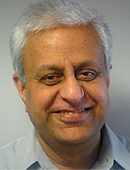Biography
Research Topics
Axonal Growth and Degeneration, Bioinformatics, Cardiovascular, Cell Biology, Cell Motility, Cell Transformation, Computational Biology, Computer Simulation, Cytoskeleton, Hippocampus, Kidney, Mathematical and Computational Biology, Membranes, Memory, Phosphorylation, Protein Kinases, Proteomics, Receptors, Signal Transduction, Synaptic Plasticity, Systems Biology, Theoretical Biology, Transcription Factors, cAMP
Axonal Growth and Degeneration, Bioinformatics, Cardiovascular, Cell Biology, Cell Motility, Cell Transformation, Computational Biology, Computer Simulation, Cytoskeleton, Hippocampus, Kidney, Mathematical and Computational Biology, Membranes, Memory, Phosphorylation, Protein Kinases, Proteomics, Receptors, Signal Transduction, Synaptic Plasticity, Systems Biology, Theoretical Biology, Transcription Factors, cAMP
Multi-Disciplinary Training Area
Disease Mechanisms and Therapeutics (DMT), Neuroscience [NEU]
Disease Mechanisms and Therapeutics (DMT), Neuroscience [NEU]
